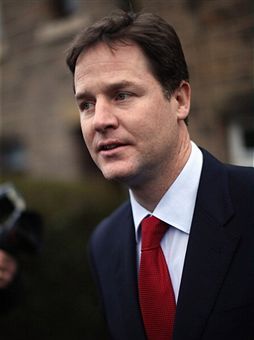 The AV referendum campaign began in earnest today. Not without justification, the No
campaign argue that AV is a Lib Dem cause, an innovation designed to make ensure they are always the power-brokers. The alternative vote, so the No camp’s argument runs, obscures political
transparency and weakens the voice of the people. The argument originates from the preludes to the formation of the Jenkins Commission in 1997.
The AV referendum campaign began in earnest today. Not without justification, the No
campaign argue that AV is a Lib Dem cause, an innovation designed to make ensure they are always the power-brokers. The alternative vote, so the No camp’s argument runs, obscures political
transparency and weakens the voice of the people. The argument originates from the preludes to the formation of the Jenkins Commission in 1997.
Not so bad for the Tories – leading article, The Spectator, 6 December 1997
Proportional representation is a political gamble with lasting office as the stake and the prize. Mr. Ashdown supports a change in the voting system because he thinks it would give the Liberal Democrats more seats in parliament. Mr Blair has not made up his mind, but may back it because he hopes it will condemn the Conservatives to perpetual opposition, preparing the ground for his ‘radical century’. Most Tories agree that a new voting system would mean political oblivion for the right wing in British politics.
All three parties, however, may be mistaken in their calculations. Proportional representation would be bad fro Britain. It would lead to weak coalition governments in which key decisions were taken behind closed doors. It would diminish the electorate’s influence on politicians and, depending on the system chosen, might cut the vital link between a constituency and its representative. It would make it impossible for an administration such as Mrs Thatcher’s to force through necessary but controversial reforms. But it would not destroy the Conservatives.
Following fundamental electoral reform, voters would probably not necessarily support the same parties as under a first-past-the-post system. Politics has become less tribal, and the electorate more fickle. Many of those voting Labour and Liberal in the election did so out of a determination to depose a Tory government for which they had lost both respect and trust. They were not expressing fundamental commitment to Mr Blair or Mr Ashdown.
There will always be a role in British politics for a party representing the conservative interest, suspicious of change for its own sake, and committed to social and economic freedom. Britain is not by instinct a radical nation. Mr Blair knows this, and his cautious approach to policy changes reflects this understanding.
The Liberals would be the first to suffer under proportional representation. They were the natural home for Conservatives wishing to express a protest vote. Within a coalition government, Mr Ashdown’s party would be closely identified with New Labour, and could only hope to retain a separate identity by pursuing a more radical, and therefore marginalising, agenda. They would become, at best, a minority interest representing Britain’s Celtic fringes. Many of their current supporters would either return to the Tories, or support Labour directly.
The Conservatives would emerge as the main opposition party and the natural home for any voters dissatisfied with the government. All governments become unpopular in the end, as they promise more than they deliver. With his grandiose rhetoric, Mr Blair is prime candidate for this kind of backlash. The Tories would be the beneficiaries.
Of course, minority parties would spring up. Some Tories might leave to set-up an anti-European faction. Equally, the Labour Left might be tempted to strike out on its own. Special interest groups like the Greens would prosper. They might hold the balance of power within parliament and be able to extract damaging and anti-democratic concessions in exchange for their support. But the main political battle would revert to a straight fight between Conservatives and Labour.
Mr Blair and Mr Ashdown should therefore consider carefully before supporting proportional representation. It may not have the effect that they think. And the Conservatives should oppose, not on the mistaken belief that it will damage their party, but because it will damage Britain’s democratic heritage.






Comments